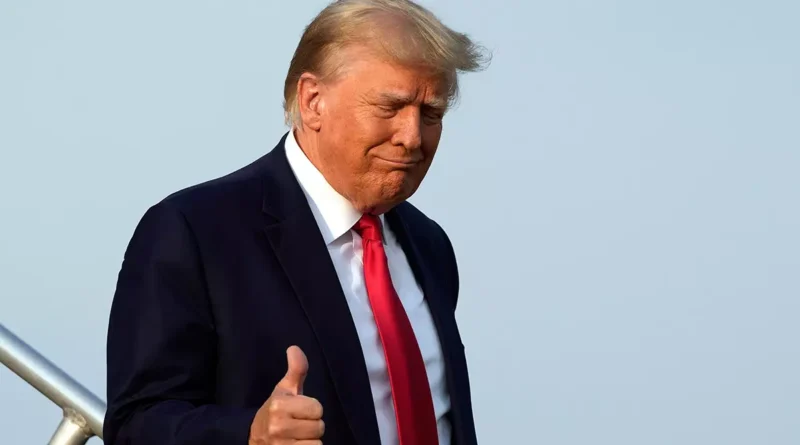Trump Tariffs Under Legal Fire: Court to Hear Major Lawsuit on May 13
On Tuesday, May 13, a three-judge panel from the U.S. Court of International Trade will review a lawsuit seeking to overturn tariffs introduced by former President Donald Trump. The case, titled V.O.S. Selections v. Trump, marks an important early step in a legal battle that could eventually reach the Supreme Court.
This New York-based federal court specializes in trade-related legal matters and will be the first judicial body to assess the validity of these controversial tariffs. While its decision won’t be final, the hearing will give the public an early indication of how the judiciary may approach this high-profile dispute.
The plaintiffs—small import-reliant businesses—are entering the courtroom with two major advantages. First, they present compelling legal claims. According to the Supreme Court’s “major questions doctrine,” courts are expected to scrutinize executive actions that carry significant economic and political weight. Trump’s tariffs are estimated by Yale’s Budget Lab to cost the average American household approximately $4,900 annually—a figure that undeniably qualifies as economically significant.
Second, the plaintiffs have attracted notable conservative support. Over a dozen former Republican officials, including three ex-senators, a former U.S. attorney general, and multiple former federal judges, submitted an amicus brief urging the court to declare the tariffs unlawful. Among these voices is former Senator John Danforth, a mentor to Justice Clarence Thomas. Given the influence of prominent conservatives within the judiciary, this could be a strategic advantage for the plaintiffs.
Nevertheless, the outcome remains uncertain. The major questions doctrine is relatively new and has so far only been invoked to strike down Biden-era policies.
How the Courts Might Rule
There are three general paths the courts could take regarding Trump’s tariffs:
Uphold the Tariffs
The simplest scenario would see the court affirm the legality of the tariffs, leaving Trump’s authority intact to impose significant import taxes.Strike Down the Tariffs Based on Existing Law
Trump primarily used the 1977 International Emergency Economic Powers Act (IEEPA) to justify his tariffs. The plaintiffs argue that this statute does not grant such authority. If the court agrees, the tariffs could be lifted—at least temporarily. However, Trump could attempt to reinstate them under the broader Trade Act of 1974, though that would involve a more prolonged process.Overturn the Tariffs Based on Constitutional Doctrines
The plaintiffs also invoke the major questions and nondelegation doctrines—legal principles allowing courts to invalidate executive actions, even if authorized by statute. If the Supreme Court follows this route, Trump’s tariffs could be permanently struck down unless Congress enacts them through legislation.
What’s at Stake in V.O.S. Selections?
The IEEPA gives the president authority to regulate transactions involving foreign interests—but only in response to an “unusual and extraordinary threat” after declaring a national emergency.
Trump’s justification for the tariffs was America’s persistent trade deficits. However, the amicus brief argues that such deficits are long-standing economic trends and don’t represent a sudden crisis. Emergency powers, they claim, should be reserved for truly urgent matters, not ongoing policy issues better addressed by Congress.
Trump’s team counters that courts lack the authority to question the declaration of a national emergency. They cite lower court rulings supporting the president’s discretion in such matters. Still, the IEEPA explicitly limits its use to addressing extraordinary threats, opening the door for judicial review on whether long-term trade deficits meet that threshold.
Even if the IEEPA does authorize tariffs, the plaintiffs assert that the major questions doctrine requires courts to interpret statutes narrowly when dealing with economically significant policies. As the Supreme Court stated in Utility Air Regulatory Group v. EPA (2014), Congress must be explicit when granting agencies broad authority.
Trump’s lawyers argue that this doctrine should not apply to presidential powers, especially those involving national security or foreign affairs. They claim the doctrine has never been used to challenge a president’s foreign policy decisions.
That’s true—so far, the major questions doctrine has only been applied to domestic regulatory policies during Biden’s tenure. There’s little precedent for its use against a president’s direct action.
However, Judge Ryan Nelson, a Trump appointee, has opined that the doctrine does apply to presidential conduct, given its basis in the constitutional separation of powers.
There’s also debate over how much deference courts should give to presidential actions involving foreign affairs. But Trump’s tariffs extend beyond diplomacy; they represent one of the most significant domestic economic interventions in recent U.S. history. He has defended them primarily as a strategy to boost American manufacturing jobs.
